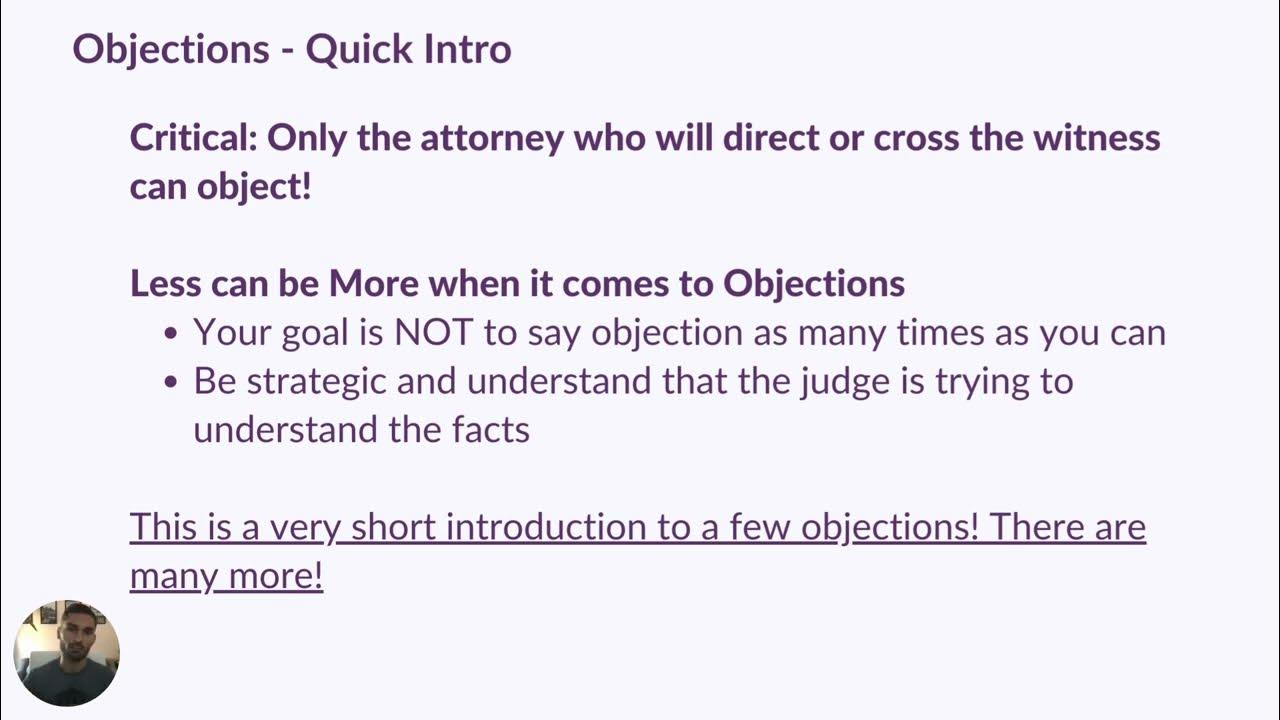Verbal Act
Summary
TLDRThe video explains the distinction between hearsay and verbal acts in legal proceedings. Hearsay involves out-of-court statements used to prove the truth, while verbal acts have legal significance regardless of their truthfulness. For example, in defamation cases, a witness can confirm that a damaging statement was made without validating its truth. Additionally, the concept of a 'verbal part of an act' clarifies ambiguous actions by providing context through accompanying words. Understanding these distinctions is crucial for legal arguments, as context can shift a statement's classification from hearsay to a verbal act.
Takeaways
- 😀 Hearsay refers to out-of-court statements used to prove the truth of the matter asserted, which are typically inadmissible in court.
- 😀 Verbal acts are statements that have legal significance by themselves and can be admissible in court, regardless of their truth.
- 😀 In a defamation case, it's necessary to prove that the defendant made a hurtful statement, not to prove that the statement itself is true.
- 😀 A verbal act is not considered hearsay because it is not offered for its truth; its purpose is to show that the statement was made.
- 😀 Contracts can be formed through verbal acts where the acceptance of an offer is acknowledged, regardless of the truth of the statement.
- 😀 Threats, warnings, and promises are examples of verbal acts that can be admitted as evidence in legal cases.
- 😀 The verbal part of an act clarifies ambiguous physical actions through accompanying words, providing context and meaning.
- 😀 For a verbal part of an act to be admissible, it must meet four criteria related to legal relevance, ambiguity, significance, and simultaneity.
- 😀 Context is crucial in determining whether a statement is classified as hearsay or a verbal act; the same words can fit both categories depending on the situation.
- 😀 For personalized legal guidance, consulting a legal expert is recommended to navigate complex legal issues effectively.
Q & A
What is hearsay in legal terms?
-Hearsay refers to an out-of-court statement that is offered to prove the truth of the matter asserted in the statement, which is generally not admissible in court.
Why do court cases require people to testify under oath?
-Testifying under oath ensures that witnesses provide reliable and truthful statements, as they can be held legally accountable for their testimony.
What are verbal acts?
-Verbal acts, also known as legally operative facts, are statements that have legal significance and can be admissible in court, regardless of their truth.
Can a defamation case involve hearsay?
-No, in a defamation case, the statement made by the defendant is not considered hearsay if it is used to show that the statement was made, rather than to prove its truth.
What is the significance of acceptance in a contract?
-In contract law, the acceptance of an offer is a verbal act that indicates agreement, regardless of whether the statement made during acceptance is true.
What types of statements can be considered verbal acts?
-Threats, warnings, promises, and any statements that constitute legal acts can be considered verbal acts and may be admissible as evidence.
What is the verbal part of an act?
-The verbal part of an act refers to words spoken simultaneously with a physical action that help clarify the meaning of the action, especially when it is ambiguous.
What criteria must be met for a verbal part of an act to be admissible?
-Four criteria must be met: the conduct must matter to the issue at hand, the conduct must be ambiguous without words, the words must give legal significance to the conduct, and the words and conduct must be made by the same person at the same time.
How does context affect the classification of statements as hearsay or verbal acts?
-The same statement may be classified as a verbal act in one context and hearsay in another, highlighting the importance of context in legal interpretations.
Where can someone get legal clarity regarding their situation?
-Individuals seeking legal clarity regarding their situation can reach out to legal services such as 'Legal U,' where they can receive personalized advice.
Outlines

Cette section est réservée aux utilisateurs payants. Améliorez votre compte pour accéder à cette section.
Améliorer maintenantMindmap

Cette section est réservée aux utilisateurs payants. Améliorez votre compte pour accéder à cette section.
Améliorer maintenantKeywords

Cette section est réservée aux utilisateurs payants. Améliorez votre compte pour accéder à cette section.
Améliorer maintenantHighlights

Cette section est réservée aux utilisateurs payants. Améliorez votre compte pour accéder à cette section.
Améliorer maintenantTranscripts

Cette section est réservée aux utilisateurs payants. Améliorez votre compte pour accéder à cette section.
Améliorer maintenantVoir Plus de Vidéos Connexes

TX YG Objections - Trial Court

[SpecCiv] Special Civil Actions Preliminary matters (Video12)

ATOS PROCESSUAIS - CONCEITO E CLASSIFICAÇÕES | Parte 1 | Direito Processual Civil

SURAT KUASA KHUSUS

PERTANGGUNGJAWABAN PIDANA | Pasal 36 - 39 UU NO 1 TAHUN 2023 TENTANG KUHP

Hukum Acara PTUN: Panduan Lengkap Mengajukan Gugatan di Pengadilan Tata Usaha Negara
5.0 / 5 (0 votes)
